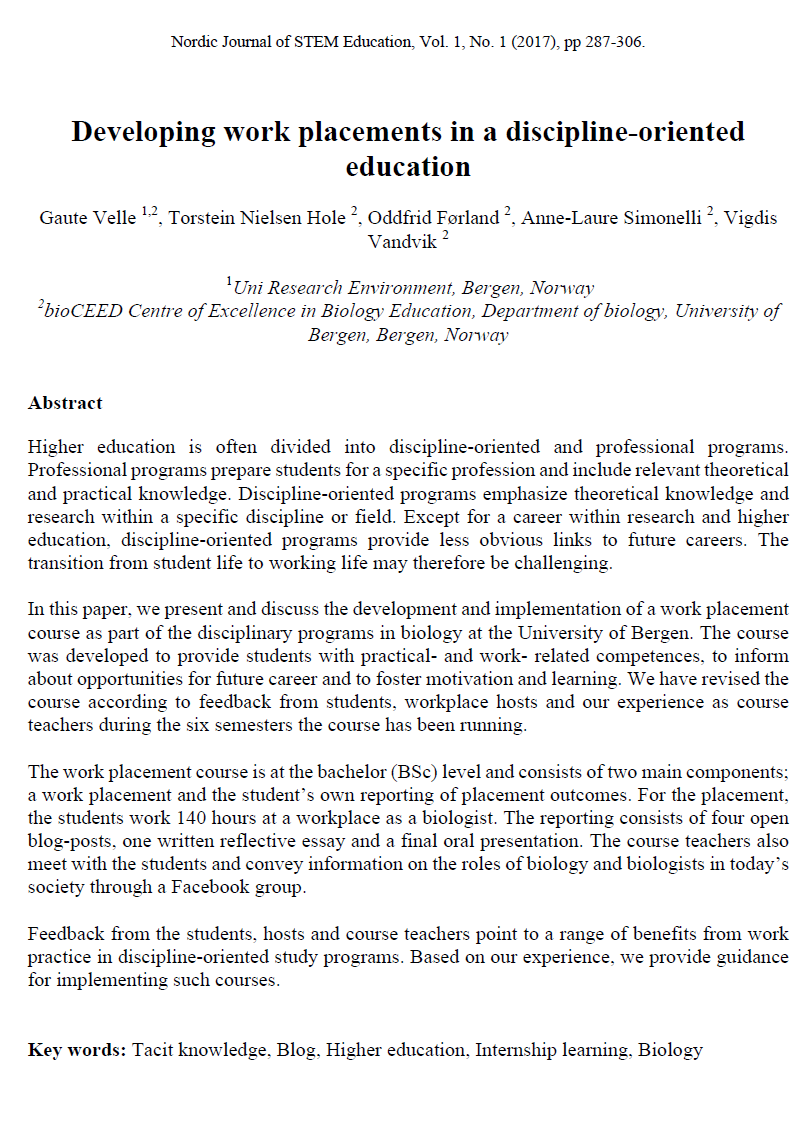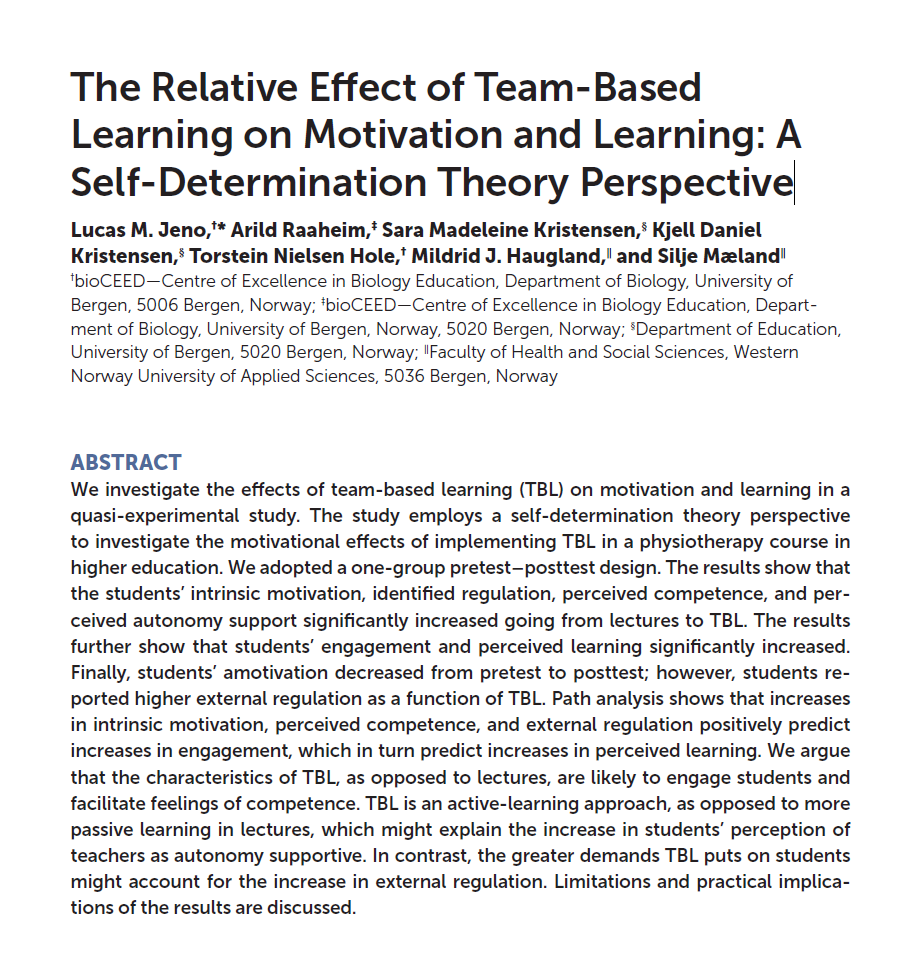NOKUT has released the seventh edition of SFU-magazine. Click on the left cover to read it in Norwegian, or on the right cover to read it in English.
Centre for Excellence in Biology Education (2014-2023)
NOKUT has released the seventh edition of SFU-magazine. Click on the left cover to read it in Norwegian, or on the right cover to read it in English.
Gaute Velle and colleagues from bioCEED and PRIME have recently published the article “Developing work placements in a discipline-oriented education” in the Nordic Journal of STEM Education.
Abstract
 Higher education is often divided into discipline-oriented and professional programs. Professional programs prepare students for a specific profession and include relevant theoretical and practical knowledge. Discipline-oriented programs emphasize theoretical knowledge and research within a specific discipline or field. Except for a career within research and higher education, discipline-oriented programs provide less obvious links to future careers. The transition from student life to working life may therefore be challenging.
Higher education is often divided into discipline-oriented and professional programs. Professional programs prepare students for a specific profession and include relevant theoretical and practical knowledge. Discipline-oriented programs emphasize theoretical knowledge and research within a specific discipline or field. Except for a career within research and higher education, discipline-oriented programs provide less obvious links to future careers. The transition from student life to working life may therefore be challenging.
In this paper, we present and discuss the development and implementation of a work placement course as part of the disciplinary programs in biology at the University of Bergen. The course was developed to provide students with practical- and work- related competences, to inform
about opportunities for future career and to foster motivation and learning. We have revised the course according to feedback from students, workplace hosts and our experience as course teachers during the six semesters the course has been running.
The work placement course is at the bachelor (BSc) level and consists of two main components; a work placement and the student’s own reporting of placement outcomes. For the placement, the students work 140 hours at a workplace as a biologist. The reporting consists of four open blog-posts, one written reflective essay and a final oral presentation. The course teachers also meet with the students and convey information on the roles of biology and biologists in today’s society through a Facebook group. Feedback from the students, hosts and course teachers point to a range of benefits from work practice in discipline-oriented study programs. Based on our experience, we provide guidance for implementing such courses.
Reference and link to the article
Velle, G., Hole, T. N., Førland, O., Simonelli, A.-L., and Vandvik, V. (2017). Developing work placements in a discipline-oriented education Nordic Journal of STEM Education, Vol. 1, No. 1 (2017), pp 287-306.
About the author
[simple-staff-list group="GV"]Lucas Jeno and colleagues from bioCEED, PRIME and Høgskulen på Vestlandet have recently published the article “The Relative Effect of Team-Based Learning on Motivation and Learning: A Self-Determination Theory Perspective”.
Abstract
 We investigate the effects of team-based learning (TBL) on motivation and learning in a quasi-experimental study. The study employs a self-determination theory perspective to investigate the motivational effects of implementing TBL in a physiotherapy course in higher education. We adopted a one-group pretest–posttest design. The results show that the students’ intrinsic motivation, identified regulation, perceived competence, and perceived autonomy support significantly increased going from lectures to TBL. The results further show that students’ engagement and perceived learning significantly increased. Finally, students’ amotivation decreased from pretest to posttest; however, students reported higher external regulation as a function of TBL. Path analysis shows that increases in intrinsic motivation, perceived competence, and external regulation positively predict increases in engagement, which in turn predict increases in perceived learning. We argue that the characteristics of TBL, as opposed to lectures, are likely to engage students and facilitate feelings of competence. TBL is an active-learning approach, as opposed to more passive learning in lectures, which might explain the increase in students’ perception of teachers as autonomy supportive. In contrast, the greater demands TBL puts on students might account for the increase in external regulation. Limitations and practical implications of the results are discussed.
We investigate the effects of team-based learning (TBL) on motivation and learning in a quasi-experimental study. The study employs a self-determination theory perspective to investigate the motivational effects of implementing TBL in a physiotherapy course in higher education. We adopted a one-group pretest–posttest design. The results show that the students’ intrinsic motivation, identified regulation, perceived competence, and perceived autonomy support significantly increased going from lectures to TBL. The results further show that students’ engagement and perceived learning significantly increased. Finally, students’ amotivation decreased from pretest to posttest; however, students reported higher external regulation as a function of TBL. Path analysis shows that increases in intrinsic motivation, perceived competence, and external regulation positively predict increases in engagement, which in turn predict increases in perceived learning. We argue that the characteristics of TBL, as opposed to lectures, are likely to engage students and facilitate feelings of competence. TBL is an active-learning approach, as opposed to more passive learning in lectures, which might explain the increase in students’ perception of teachers as autonomy supportive. In contrast, the greater demands TBL puts on students might account for the increase in external regulation. Limitations and practical implications of the results are discussed.
Reference and link to the article
Jeno, L. M., Raaheim, A., Kristensen, S. M., Kristensen, K. D., Hole, T. N., Haugland, M. J., and Mæland, S. (2017). The Relative Effect of Team-Based Learning on Motivation and Learning: A Self-Determination Theory Perspective. CBE—Life Sciences Education • 16:ar59, Winter 2017.
About the author
[simple-staff-list group="LJ"]bioCEED is seeking a new student representative from UiB.
bioCEED is a Centre of Excellence in Education (SFU) in the field of biology and is a collaboration between Department of Biology at University of Bergen, Arctic Biology at the University Centre at Svalbard (UNIS), the Higher Education Research Unit at University of Bergen and the Institute of Marine Research. bioCEED is funded by NOKUT and the partner institutions. The overarching aim of the SFU arrangement is to contribute to the development of excellent quality in higher education.
bioCEED will work to develop innovative and excellent teaching in biology. Key points in the bioCEED plans are:
UiB has two student representatives that cooperate with two student representatives at UNIS. The student representatives represent the students in bioCEEDs Steering Group and Board. Representatives are appointed for one year (with option for longer appointment).
Who is eligible to apply?
– You are a student at BIO or MBI
– You are engaged in education and the development of teaching and learning
– You are active in the student community and have a good network of contacts among students
– Experience in student organizations, boards, councils or working groups is an advantage
– Experience as a teaching assistant or similar is an advantage
Responsibilities:
– Represent the students bioCEEDs Steering group (and Board if applicable), and bioCEED activities
– Be a contact point between bioCEED and students
– Contribute to bioCEED activities and outreach
– Lead the student driven project biORAKEL, and contribute to other bioCEED projects
Application: Write a short text about yourself and your education and experience. Why do you want to be a student representative in bioCEED, and what will be your contribution? Deadline : 1st December 2017. Send application by e-mail to: oddfrid.forland@uib.no marked Application student representative bioCEED.
More information: Centre leader Vigdis Vandvik, current BIO student representatives Ragnhild Gya and Mari Vold Bjordal or coordinator Oddfrid Førland.
bioCEED søker en ny studentrepresentant fra UiB.
bioCEED er et Senter for fremragende utdanning (SFU) i fagområdet biologi og er et samarbeid mellom Institutt for biologi (BIO) ved UIB, Avdeling for arktisk biologi ved UNIS, Seksjon for Universitetspedagogikk ved UIB og Havforskningsinstituttet. bioCEED er finansiert av Kunnskaps-departementet og partnerne. SFU-ordningens fremste formål er å fremme kvalitet i høyere utdanning.
bioCEED skal arbeide for å utvikle innovativ og fremragende undervisning i biologi. Sentrale punkt i planene er:
UiB har to studentrepresentanter som samarbeider med to studentrepresentanter ved UNIS. Studentrepresentantene representerer også studentene i bioCEEDs styringsgruppe og Styre.
Vervet er i utgangspunktet med et års varighet fra oppnevning.
Hvem er kvalifisert for å søke?
– Du er student ved BIO eller MBI
– Du er engasjert i utdanningskvalitet og utvikling av undervisning
– Du er aktiv i studentmiljøet og har et godt kontaktnett blant studentene
– Erfaring fra studentorganisasjoner, styrer, råd eller arbeidsgrupper er en fordel
– Erfaring som undervisningsassistent o.l. er en fordel
Arbeidsoppgaver:
– Representere studentene i bioCEEDs styringsgruppe og i bioCEED sine aktiviteter
– Være kontaktledd mellom bioCEED og studentene
– Bidra i bioCEED-aktiviteter og formidling av bioCEEDs arbeid
– Lede det studentdrevne prosjektet biORAKEL, og bidra inn i andre bioCEED-prosjekter
Søknad:
Skriv litt om deg selv og din utdanning og erfaring. Hvorfor ønsker du å være studentrepresentant og hva kan du bidra med? Frist: 1. desember 2017. Søknad sendes på e-post til: oddfrid.forland@uib.no og merkes Søknad studentverv bioCEED.
Mer informasjon:
Kontakt senterleder Vigdis Vandvik (vigdis.vandvik@uib.no), koordinator Oddfrid Førland (oddfrid.forland@uib.no, 55 58 22 24) eller sittende studentrepresentanter fra BIO Ragnhild Gya (ragnhild.gya@student.uib.no) og Mari Vold Bjordal (mbj019@student.uib.no).